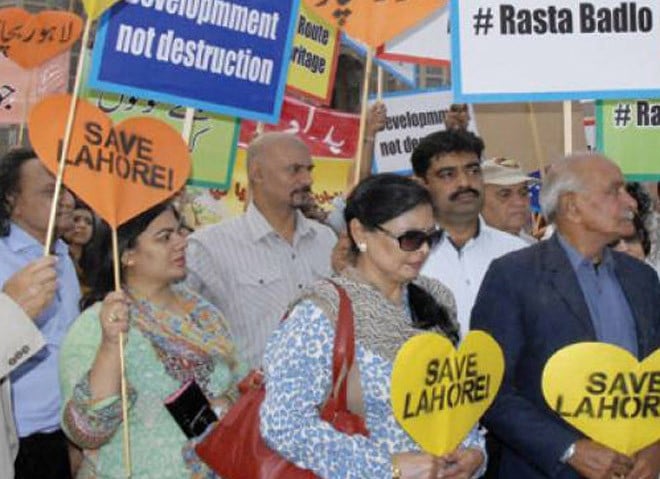
Are the on-going mega development projects representative of our needs and wishes?

Do the mega development projects in Lahore, and the previous ones as well, have the seal of approval of the common man who commutes daily. Are the projects planned and decisions taken after thorough and proper consultations with the biggest stakeholders of the whole ‘development’ exercise, the Lahoris?
From the common man’s side, answers to these questions are mostly in the negative, except for the government officials who claim that every step is taken to ensure participation of the people in the decision-making of Lahore’s development and that their concerns have been fully addressed.
On its website, Lahore Development Authority claims that LDA "attempts to turn Lahore into an attainable city with combined support of the people, private sector, and different levels of the government…." But does it live up to what it claims?
LDA’s Chief Engineer, Israr Saeed, negates the impression that the development of Lahore is the result of an individual’s whims or a government authority, "It is a participatory and transparent exercise where all the relevant government departments, right from the planning and development down to the district level, are involved in the planning and execution of the projects, so that no important aspect is left unattended."
Saeed says projects have not been made by a certain political government but are mentioned in the Master Plan of Lahore. "The first Master Plan of Lahore was made in 1990 with the support of the Japanese company JAICA. It was a roadmap for Lahore’s development for the next 20 years, keeping in view the needs of the city and its population. The next Master Plan was made in 2011 to be completed in 2030. We cannot change the plan whenever we want."
He believes the process of approval of the on-going development projects was participatory and transparent, "The projects are being executed by a provincial government which is the political representative of the people. So, they are taking every care that the projects are good for the people. In addition to the Orange Line, there will be a Purple Line and Blue Line as well to cover the whole city." He dismisses criticism against these projects as useless, "The projects will be completed anyway. The criticism is just a hype created by some NGOs to get media attention."
Read also: Big projects at what cost?
Senior citizens and rights activists of Lahore do not agree with Saeed. I.A. Rehman, Secretary General, Human Rights Commission of Pakistan, says people are hardly consulted when a mega development project is undertaken by the government, "A few public hearings have taken place, such as in the case of Signal Free Corridor but unfortunately such hearings are perfunctory. They do not properly address the concerns of the people. And even this process has stopped lately."
Rehman says there is no transparency in the whole exercise, "Even the Master Plans of Lahore are tampered with." The Master Plan for Islamabad was also changed. Originally, they had to build an elevated Metro Bus with shops under it."
Dr Nasir Javed, Chief Executive Officer, The Urban Unit, agrees with Rehman when he says that the government has little or no room for people’s concerns while planning and executing a project. "People are not listened to, frankly. Also, the local government has just been elected so there is no local tier in place at the moment and that makes the task of going to the grassroots even more difficult. The provincial government is doing everything."
The Urban Unit, established in 2006 as a Project Management Unit (PMU) of the Planning and Development department under the government of Punjab, was converted into an independent private limited company in 2012.
For instance, the Planning and Development Department, the principal planning organisation at the provincial level, coordinates and monitors all development programmes of various government departments, preparing Annual Development Programme (ADP) and Medium Term Development Framework (MTDF) in co-ordination with other departments.
Javed says public hearings are an eye-wash. "Public hearing is usually held by just one department of the government -- The Environmental Impact Assessment (EIA), which is not enough." He gives a suggestion, "The government should hold a seminar every month in Alhamra Arts Council, which should be open for the general public, and present their development plans before the people for their feedback and objections."